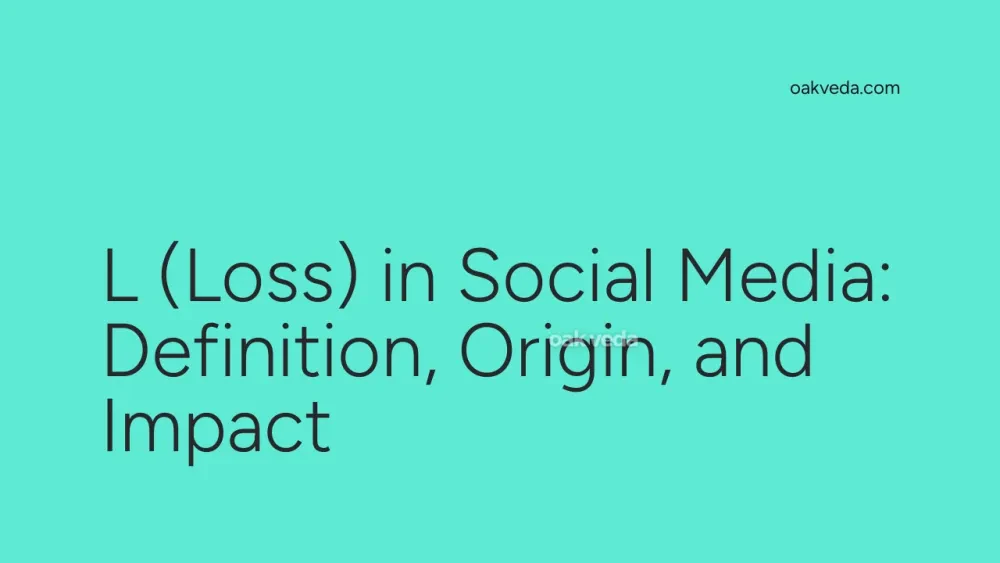
What is L in Social Media?
In the fast-paced world of social media, "L" has emerged as a popular shorthand for "loss." This concise abbreviation is used to describe situations where someone experiences a defeat, failure, or setback. When users say they "took an L" or refer to a situation as an "L," they're acknowledging a lack of success or an undesired outcome in various contexts, from personal experiences to competitive activities.
Origin and Development of L
The use of "L" as slang for "loss" likely originated in online gaming communities and sports discussions. As social media platforms gained popularity, this shorthand quickly spread to broader contexts. The exact timeline of its emergence is unclear, but its usage has significantly increased over the past decade, becoming a staple in online communication, particularly among younger generations.
How L Works in Social Media Communication
The beauty of using "L" in social media lies in its simplicity and versatility. Users can easily incorporate it into their posts, comments, or messages to quickly convey disappointment or acknowledge a setback. For example:
- "Took a massive L on that exam 😭"
- "Our team's performance today was a total L"
- "Dating in 2023? Nothing but Ls"
This shorthand allows for efficient communication, fitting well with the character limits and fast-paced nature of many social media platforms.
Types or Variations of L
While "L" primarily stands for "loss," it has spawned some variations in usage:
- Big L: Indicates a significant or particularly embarrassing failure
- Small L: Refers to a minor setback or disappointment
- W: The opposite of "L," used to denote a win or success
Popular Examples of L in Social Media
The use of "L" has become widespread across various social media platforms:
- On Twitter, users often comment "L" under posts about failures or embarrassing moments
- TikTok creators use "L" in video captions to describe unfortunate events or mistakes
- Instagram stories featuring the "L" emoji (🇱) to summarize a bad day or experience
Impact of L on Social Media Culture
The prevalence of "L" in social media discourse has had several notable impacts:
-
Normalization of failure: By making it easy to acknowledge setbacks, "L" has helped normalize discussions about failure and disappointment.
-
Community building: Sharing "Ls" can create a sense of camaraderie among users who have experienced similar setbacks.
-
Humor and self-deprecation: Many users employ "L" in a humorous or self-deprecating manner, lightening the mood around negative experiences.
-
Brevity in communication: As a single-letter abbreviation, "L" exemplifies the trend towards more concise online communication.
Controversies or Debates Surrounding L
While "L" is generally seen as a harmless slang term, some concerns have been raised:
-
Oversimplification: Critics argue that reducing complex situations to a simple "L" may trivialize important issues or experiences.
-
Potential for cyberbullying: In some cases, the term could be used to mock or belittle others' misfortunes.
-
Generational divide: Older users or those unfamiliar with internet slang may find the term confusing or exclusionary.
How Brands and Influencers Use L
Savvy brands and influencers have incorporated "L" into their social media strategies:
-
Relatable content: Sharing personal "Ls" can make influencers seem more authentic and relatable to their audience.
-
Engagement bait: Brands might ask followers to share their biggest "L" of the day, encouraging interaction and user-generated content.
-
Humor in marketing: Some companies use "L" in their social media posts to add a touch of self-deprecating humor to their brand voice.
Future Trends Related to L
As social media language continues to evolve, we can expect:
-
New variations: Just as "W" emerged as an antonym, new related terms may develop.
-
Cross-platform spread: "L" may become even more ubiquitous across different social media platforms and online spaces.
-
Integration into mainstream language: As with many internet slang terms, "L" may eventually find its way into more formal contexts.
FAQs about L in Social Media
-
Is "L" only used by younger generations? While more common among younger users, "L" is increasingly used across various age groups on social media.
-
Can "L" be used in positive contexts? Generally, "L" is used for negative outcomes. For positive situations, users typically use "W" (win).
-
Is it appropriate to use "L" in professional online communication? It's best to avoid using "L" in formal or professional settings, as it may be considered too casual or unprofessional.
-
How do I use "L" correctly in a sentence? You can say "take an L" or simply use "L" as a standalone comment. For example, "I took an L on that presentation" or just "L" in response to someone sharing a setback.
-
Are there cultural differences in the use of "L"? While "L" is widely understood in English-speaking online communities, its usage and interpretation may vary in different cultural contexts.
Understanding the nuances of social media slang like "L" is crucial for navigating online communication effectively. As language continues to evolve in the digital age, staying informed about these trends helps users engage more authentically and comprehensively in social media discourse.
You may be interested in:
- Opp: Definition, Origin, and Impact in Social Media
- Lowkey: Definition, Origin, and Impact on Social Media
- Caught in 4K: Definition, Origin, and Impact on Social Media
- B2C: Definition, Origin, and Impact on Social Media Marketing
- Shadowban: Definition, Origin, and Impact on Social Media
- Ate: Definition, Origin, and Impact in Social Media Slang

